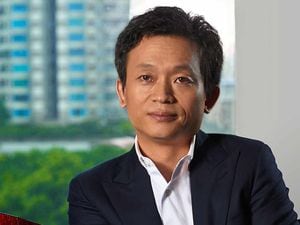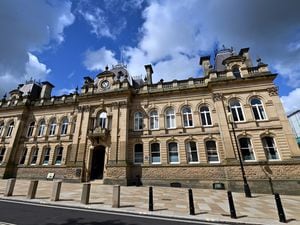Wolves v West Brom v Villa: How do the new Chinese owners compare?
Albion's takeover makes the Baggies the third of the region's side to be taken over by investors from the Far East - but how do the new owners compare?

They are the new breed of Chinese businessmen taking over our football clubs, bringing with them the promise of massive investment and success on the pitch.
Guochuan Lai's deal to buy Albion means the Baggies have become the third of the region's sides to be taken over by investors from the Far East.
It comes hot on the heels of Fosun International taking control of Wolves, which followed Tony Xia's deal to buy Villa.
China has made it abundantly clear it wants to dominate football, and the quickfire deals to buy the region's three biggest clubs are unlikely to be the country's last forays into English football.
The prospect of being bankrolled to glory now towers over West Midlands clubs like a beacon of hope.
It happened to Chelsea following the takeover by Roman Abramovich in 2003. Manchester City were going nowhere but out of business until the Abu Dhabi United Group appeared with their billions in 2008.
But history tells us it is wise to proceed with caution when it comes to foreign ownership of our football clubs.
For every success story there are at least three abject failures.
Randy Lerner's arrival at Villa had fans dreaming of league titles and a repeat of the 1982 European Cup triumph, but just 10 years later the club faces life in the Championship. At Birmingham City, Carson Yeung landed in 2009 and made a series of outlandish promises. Yet his short time at the club ended when he was jailed for money laundering.

The last few weeks have been a whirlwind for Wolves fans since Fosun breezed in with its £30 million takeover.
In early July rumours of a Chinese takeover started doing the rounds, with Robin Li – the seventh richest man in China – expected to be the one to come in and pump untold riches into the club.
However it was the Fosun Group that were to seal the deal, with promises to invest between £20m and £30m over the next two years and get the club into the Premier League as soon as possible.
The figure quoted may have initially underwhelmed many fans, but there has been plenty of activity in terms of personnel changes, both on and off the pitch.
Jez Moxey has followed Steve Morgan out of the door, while to the surprise of many, manager Kenny Jackett was replaced by Walter Zenga.
New players have come in, with the promise of more deals on the horizon before the end of the transfer window.
The scenes of jubilation outside Molineux when new club supremo Jeff Shi first greeted fans were truly a sight to behold. He is said to have spent two years looking at more than 15 clubs across Europe before settling on Wolves.
There's no escaping the fact that there is a decidedly cosmopolitan feel about the new Wolves. There is a real sense that the club are going places.
Wolves' recent history is one of ups and downs. From the glory of the Premier League to the despair of the fall into League One.
Now, finally, the club appears to not only have the financial clout to gain promotion, but also to cement a place in the top flight.

Lai seems to be adopting a level headed approach if his first official statement is anything to go by.
He's taken the usual new owner stance of referring to his new baby as 'a great club', but will no doubt have raised a few eyebrows with his claim to have been following Albion for nearly 40 years.
He comes with no outlandish promises, with a stated aim of maintaining the club's stable structure and 'respecting its well-run nature and its heritage'.
Fans will likely to be relieved to hear that he has no intention of changing the club's ethos, implying there will be none of the drastic measures that often irritate supporters when new owners come in.
Lai does, however, say he wants to establish the club as a top half side in the long-term.
This is a situation Jeremy Peace tried admirably to do during his 14 years as chairman.
Bringing in new players will be an immediate priority, with Albion having pulled out of a £15 million deal for West Ham's Diafra Sakho on Thursday because he would not be fit enough for the start of the new season.
There's been a very business-like approach to the early stages of the new regime, with Lai having described the club as 'a great investment' to add to his portfolio.
Albion fans are used to seeing a well run club that knows how to balance the books. What has been lacking is a consistent spot in the Premier League and a commitment to long-term investment in the playing squad.
Now with Lai at the helm, they will be hoping that an exciting future awaits.

He's a bit of a character, our Tony.
Within days of securing the £60 million takeover of the club, Xia had vowed to transform Villa into one of the world's top sides.
He pledged to pump up to £50m into their coffers before next season and said that 'talented but lazy' players would be moved on.
But he didn't stop there. Xia has world domination on his mind, and says he is exploring the idea of buying a franchise in the
Chinese Super League and harbours ambitions of running clubs in the United States and India.
The 39-year-old is thinking big, and judging by his regular and often bizarre tweets, he is not likely to be accused of being a shrinking violet during his time in B6.
So far he has lambasted players for disloyalty, attempted to reassure fans over the club's future by quoting Kafka, and described Ian Holloway as a 'failed player, failed manager and now f***ed pundit'.
Of course, unlike their Black Country neighbours, Villa have been here before.
Randy Lerner's arrival at Villa Park in 2006 brought with it hopes of great success, and for a while, things looked promising.
But the situation quickly turned sour. Lerner lost interest, and a decade down the line the club was relegated and sold.
It is fair to say that plenty of Villa fans still need to be convinced that Xia is the man to take the club forward, although most are willing to give him a fair crack of the whip.
The £12m signing of Ross McCormack has gone some way to relieving fans' frustrations over a summer that had lacked activity in the transfer market.
Only time will tell if Xiu's efforts result in an immediate return to the top flight.
Some business experts say they are cynical of the Chinese investment in West Midlands football. Simon Chadwick, a professor of sports enterprise at Salford Business School, views the takeovers of Villa, Wolves and Albion as cold, hard business decisions on the part of the owners.
"This is no longer the 00s," he said. "And the sugar-daddy days of seemingly aimless or vanity-driven football club purchases have gone."
While that may well be the case, supporters can still be forgiven for dreaming a little. And when you look at the positions that Villa and Wolves were in prior to the arrival of the Chinese, it would be hard to argue the future for either club was particularly rosy.
Villa had been starved of investment, with the club also reeling from successive poor managerial appointments on the part of the increasingly disinterested Lerner.
Wolves looked a million miles away from genuine promotion candidates.
Under Steve Morgan the club was never going to be able to compete at the top of the Championship, putting aspirations of the Premier League firmly on the backburner. They are now owned by one of the richest men in China – the 11th richest, according to the Forbes Rich List.
The position at Albion is slightly different, as Jeremy Peace has maintained the club's position as a force in the top flight.
But the new billionaire owners have the resources to take the Baggies to previously uncharted heights.
In the UK, club ownership has transformed in the last decade. When the Glazers became majority shareholders at Manchester United it prompted widespread outrage, but their financial success has prompted others to aim for the same pot of gold. The Glazers paid £790 million for the Old Trafford club, but they have seen the value surge to £1.65 billion, an increase of £860m.
The Baggies deal means a total of 26 clubs in England's top two divisions are now foreign-owned.
Whether the moneybags investors are here for the long haul remains to be seen, but fans of Villa, Wolves and Albion will be hoping for success on the field.





